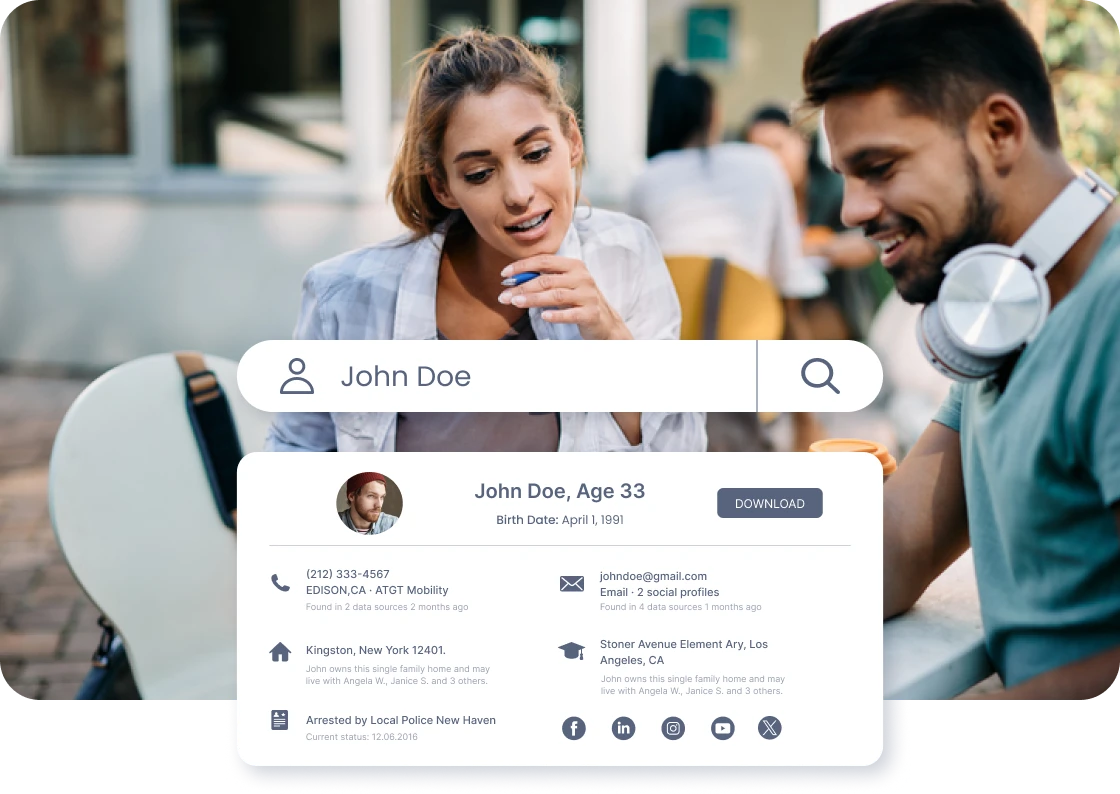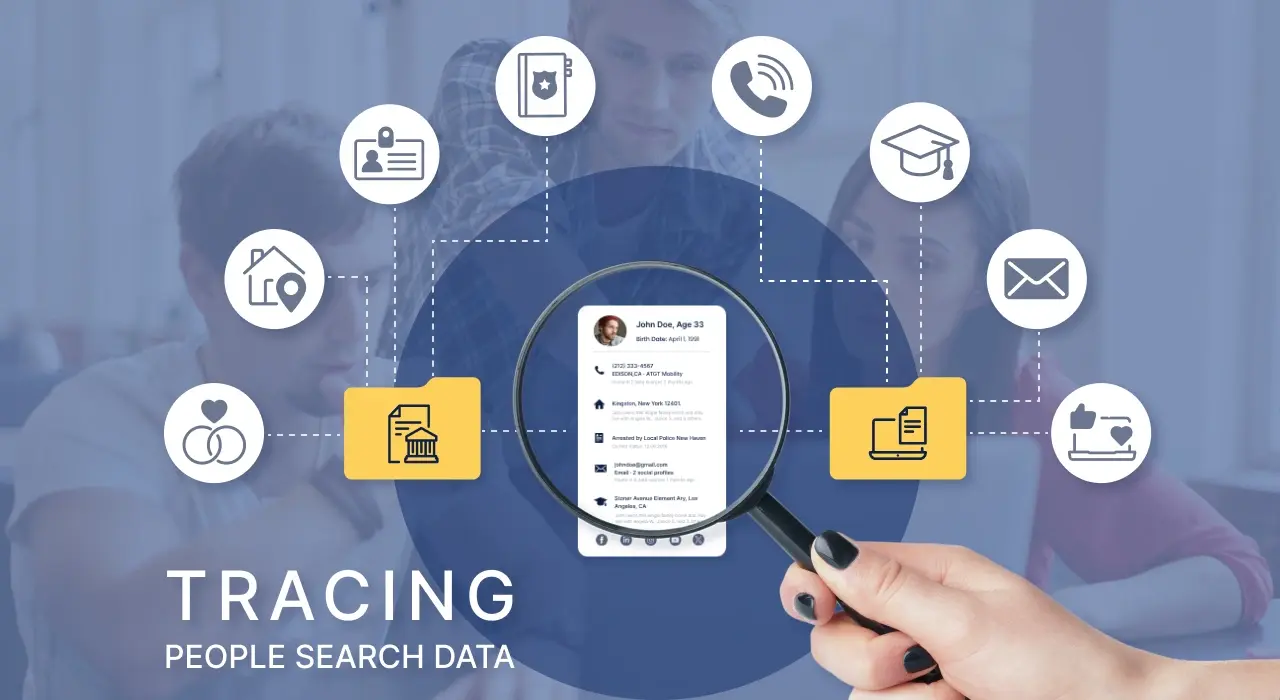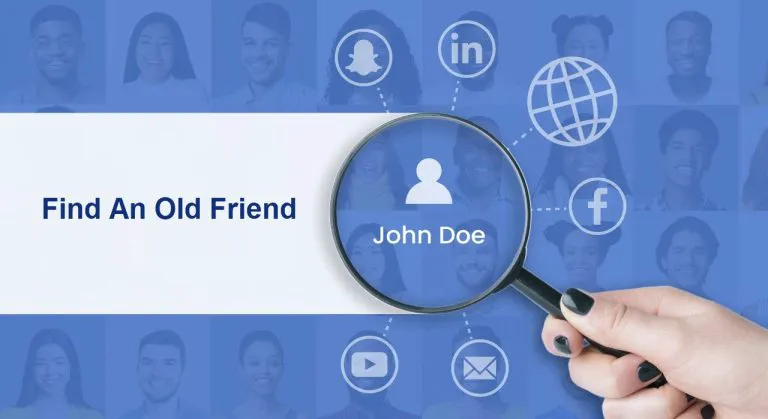
What is a people search service?
People search service, also known as people search engine or people finder, is an online tool that helps you find information about people. It works similarly to a regular search engine - simply input a name, and you’ll receive plenty of information about the person. You can also search by a phone number, an email address, an address, or even a username.

In fact, the concept of people search isn’t new. Through deep searches into the evolution of these services, we found their roots in the historical uses of phone books. Printed directories like White Pages and Yellow Pages that listed names, phone numbers, and addresses were the primary sources for people to look up contact information before the advent of the Internet.
With the rise of the digital era, enormous amounts of personal information and public records have been digitized and made accessible online, revolutionizing the way that people connect and also the people search industry. Today’s people search services have greatly enhanced their capabilities and the depth of information available. Relying on advanced technologies, they collect data from extensive databases to create detailed reports of individuals, helping people find lost connections such as friends or relatives or verify someone’s identity, e.g. a potential date, a new friend, a nearby neighbor, or a mysterious caller.



What can you use people search services for?
There are a wide range of ways you can use people search. Here are a few common ones:
Reconnect with old friends, classmates, & family members
Research your potential dates
Learn more about your neighbors
Verify online sellers & buyers
Identify unknown phone numbers
Background check on yourself
What can you find on people search reports?
The information provided in people search reports can vary significantly depending on the type of search you perform, the quality of the service you use, and the data available on the search subject. A typical people search report will include the following sections, but may not contain data in every field.
First & last names
Aliases
Birth information
Phone numbers
Email addresses
Possible photos
Possible relatives & associates
Current & past addresses
Jobs & education
Social media profiles
Criminal & traffic records
Finance & assets
How do people search services work?

When you first learn about tools like people search services and receive the abundant information they offer, you may be curious about how they do that. How do they acquire massive data, where do they source it from, and how do they form comprehensive composites of the specific people being searched? Figuring out the underlying mechanism of people search is essential for grasping these services and has been the most crucial part of our research.
In essence, people search services gather massive public data from various sources, either directly or through third parties, to create detailed profiles of individuals. This includes steps like cleaning, organizing and matching data.
Their data primarily comes from publicly available information, including public records from the government, social media, phone directories, mailing listings, webpages, blogs, and press reports, which are open data sources accessible to everyone. Additionally, some services may purchase data from other data brokers to enhance their data pools, and in turn, supply data to each other, as revealed by a report from the FTC (Federal Trade Commission)[1].





Since the majority of the data sources of people search services are publicly accessible, could we acquire the information through our own searches? To delve deeper, we tried to retrace the data provided by people search sites. Over three days, we’ve conducted thorough Internet searches, combing through multiple government databases like state voter information, license registration systems, county clerks and recorders, and exploring social networks, g enealogy websites, open corporate information, and more. This yielded a great deal of information, covering nearly 60% of the details found in a people search report. However, the process is far from simple; you have to be very patient and skilled at digging for information and may need to pay for certain databases.

People search services, through their in-house data aggregation and collaboration with other data brokers, can amass millions or even billions of data, orders of magnitude faster. Beyond that, they specialize in organizing that vast ocean of raw data, fitting relevant elements together to represent coherent and easy-to-read results. For example, based on a specific address, they can pull property-related information such as ownership, deeds, and possible values, and integrate a list of possible neighbors by identifying the nearby addresses.
This data-matching mechanism is a unique strength of the people search services. Some pioneering companies like PeekYou[2] and Intelius[3] have developed their proprietary technologies, and we believe those who don’t also employ intricate data-matching procedures to deliver actionable insights.




Overall, people search services provide a quick and convenient way for people to learn about others. They’re also cost-effective, providing extensive information that may take hours or even days to gather manually, at a small price, typically $20-$30 per month for unlimited reports. But to be fair, they still have their limitations. Given such a vast amount of data processed, the results can sometimes be inaccurate, incomplete, or outdated. So it’s essential to verify the information independently, especially if you’re using it for important decisions.
Is it legal and ethical to use people search services?

People search is dedicated to making finding people easier, yet there have been concerns over their legality. Does searching for someone on people search sites breach anyone’s privacy? Is it legit for us to use the information they provide? These are common questions when considering the use of such tools.
In general, it’s legit to use people search services. From a legal standpoint, they primarily aggregate publicly available information. This includes data from public records, social media profiles, and other source that anyone can legally access.
However, there are specific situations where people search services are prohibited. According to Fair Credit Reporting Act (FCRA), a federal legislation that governs the collection and uses of consumer credit information, people search sites are not consumer reporting agencies and cannot be used for making decisions about employment, admission, consumer credit, insurance, tenant screening, or any other purposes under FCRA[4].




When using people search sites for permitted purposes, it’s also crucial to consider their ethical implications. Using these tools to reconnect with families or friends or verify an online date or online seller is ethically justifiable, but using them for stalking, harassment, or discriminatory purposes is both unethical and potentially illegal. As users, we should always use people search tools for legitimate purposes and handle the information responsibly and ethically.
Learn more about people search
Browse through our people search articles for comprehensive guides and tips on finding people and information effectively.
Best people search tools

There are dozens - if not hundreds - of people search sites out there, but these tools may vary largely in their reports, features, user interface, pricing, customer, service, and so on. We tested several well-known people search tools and conducted in-depth reviews to help you choose the service that best suits your needs.

We dedicated over 560 hours to scouring the internet, viewing more than 2750 pages of online content and materials about people search services and related knowledge. Furthermore, we spent over 640 hours on hands-on practice, conducting 40 in-depth case studies that spanned 10 states and 16 counties to trace and verify potential data sources of people search sites. We’ve accessed over 150 databases and sources and utilized 43 tools for our manual searches. After extensive research, we devoted 864 hours to crafting insightful articles to present our findings clearly and concisely.
Our comprehensive guides and articles represent a total of 2,064 hours of dedicated work, all freely accessible for anyone interested in learning more about people search. If you find our content useful, please consider taking a few moments to support us. Scroll down and leave a comment, like this page, or share our posts on social media or with others. Your simple actions, which only take a few clicks and seconds, help us more than you might think.
Who’s behind the people search research lab?

It’s a team of writers who are dedicated to equipping themselves with the knowledge to understand the people search industry and have a strong mission to present findings and share tips on making searches seamless in an easy-to-understand way.

Key stages of our research process
Our research process involves several key stages:
- 01
Ideation and planning
- 02
Research and investigation
- 03
Analysis and interpretation
- 04
Presenting our findings
Ideation and planning
We begin by outlining the scope of our research, focusing on these key areas:

History of the people search industry
Incredibly powerful people search services open the door to a world of personal information, instantaneously retrievable at our fingertips. But how did they emerge? What spurred their development? What obstacles did they face? Investigating these aspects provides a solid foundation for our research, offering valuable insights into the industry’s evolution and current status.
Sources of information in reports
When we first conducted searches using one of the reputable people search services and received a report, we started to wonder: Where do they get the data? Although most of them claim that they aggregate countless sources of public records, they do not provide much details, making us intrigued to know more.
How people search services work
We know people search services work like magic, compiling all the information about an individual into a comprehensive report. But how do they manage to do that? With so many data points listed on a report, how do they identify that a certain piece of information belongs to that specific person? We all want to figure that out!
Legitimacy of using people search services
When we first conducted searches using one of the reputable people search services and received a report, we started to wonder: Where do they get the data? Although most of them claim that they aggregate countless sources of public records, they do not provide much details, making us intrigued to know more.

Research and investigation
Once we’ve defined our focus areas, we embark on a comprehensive search for relevant information and materials. Our research and investigation process involves consulting various sources and employing multiple methods to gather information and data.
Sources we consult:
Authoritative sources such as government websites and reputable news outlets
Significant reports like Data Brokers: A Call for Transparency and Accountability released by the Federal Trade Commission
Patent documents submitted by some people search services about their data-matching technologies
Various people search services for hands-on testing
Online data portals and free access for publicly available information
Methods we use:
To ensure a thorough and well-rounded understanding of the people search industry, we employ the following methods:
Industry analysis
Examining a wide range of authoritative sources, including industry reports, scholarly articles, and reputable news outlets, to gather insights on the history and trends of the people search industry.
Document review
Reviewing documents released by government agencies like the FTC and U.S. Senate Committee on Commerce, Science, and Transportation to understand where people search services get their data.
Hands-on testing
Conducting firsthand trials of various people search services to evaluate the user experience, comprehensiveness of information provided, and overall effectiveness.
Case studies
Performing in-depth analyses of specific individuals’ information provided in people search reports and attempting to trace the sources of the information.
Exploring online portals
Investigating public record databases to assess their functionality, scope, and accessibility.

Analysis and interpretation

After gathering the essential materials from various sources, our team meticulously organizes and examines them. To enhance the depth and breadth of our research and ensure that every team member forms a comprehensive understanding of these key areas, we regularly convene. During these meetings, we share our research findings, raise questions, and collaboratively seek answers.


Presenting our findings
After months of combined efforts, we’ve felt more confident than ever to equip you with the knowledge to help you use people search services wisely, effectively, and in compliance with legal and ethical standards.
We devote our efforts to two main categories of content:
Detailed Research Articles
Collaboratively written by our team, with each member contributing based on their expertise.
Comprehensive Guides
Covering various aspects of people search, including tips for finding information effectively, both with and without the use of people search services.
At supereasy.com, we prioritize delivering high-quality articles that are comprehensive and insightful. To achieve this, each article is a collaborative effort involving at least two writers to work closely together.
We also believe in the value of feedback from various sources. In addition to our writer team, we incorporate perspectives and insights from individuals outside of our writing department to produce content that resonates with our audience.








